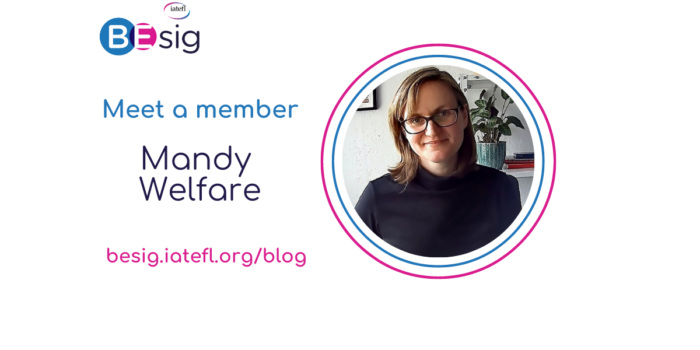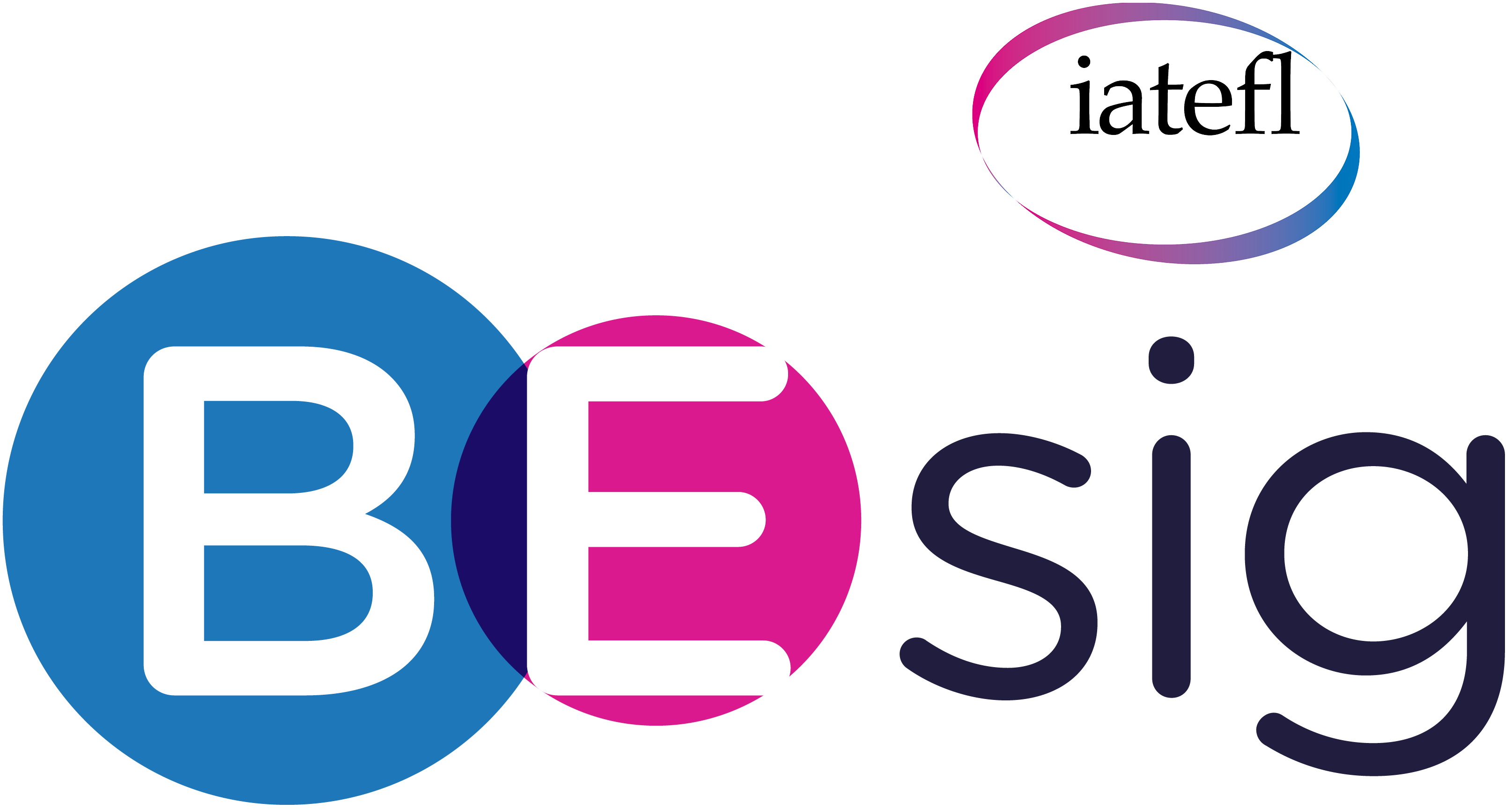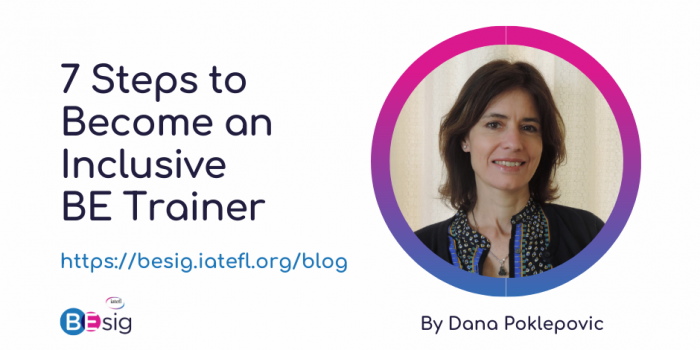
Meet a Member is back with a bang!
Our guest today is none other than the person who was behind the interview series for the past four years, the life and soul of the blog - Mandy Welfare.
We will get to know Mandy not only as an IATEFL BESIG volunteer, but also as a teacher, teacher trainer, materials writer and polyglot.
Today she will talk about the backstage of running the Meet a Member blog, CPD ideas to novice and experienced teachers, and one thing you should never do when creating an ESP course. She will mention Chat GPT, too!
Bio
Originally from Bath, UK, Mandy has worked as a Business English and Multicultural Communications trainer across Europe, as well as being a published author. She has an MA Education and is currently working as a Senior EAP lecturer and materials writer at Arden University in Berlin, Germany.
1. You speak quite a few languages. Does your personality or the way you communicate change when you switch a language? If yes, how?
Speaking languages has always helped me integrate into different cultural settings and learn about the places I’m living in. I definitely feel and have felt different when speaking them. However, the stage of life I was at probably had an impact as well. For example, I was 18 living in Paris and speaking French made me feel so mature; I was 22 in Spain and speaking Spanish made me feel liberated. Learning German was different as I worked in the language, so it gave me a different kind of power, especially as people didn’t expect a Brit to speak it so well. Hungarian is a different game all together as I’m learning it for my son. Due to the linguistic structure, I experienced what it feels like to be a complete beginner, which has definitely helped my teaching practice. Even though I’m at a beginner’s level, it’s the language which instils the most confidence and pride in me as it is so insanely difficult! I remember managing to order a coffee in Budapest and getting it right. That was an achievement!
2. What does IATEFL BESIG mean to you, can you put it in a few key words?
Being part of a Professional Community is the first thing that comes to mind. I’ve been a member of IATEFL BESIG for around 10 years now and it has pushed me to professionalise myself and deepen my knowledge. It also keeps me on my toes as attending the conferences where everyone is so experienced really makes me want to keep on top of current research and trends. The support that comes with being part of this community is really special. I’ve had mentors, advisors, cheerleaders, coaches, and I’ve done the same for others. Finally, friendship. The pandemic really made me realise the strength of the friendships we have in this community.
3. What have you learnt from your volunteering experience? What was the most challenging part for you?
Volunteering has always been important to me as it’s about giving back to communities which have helped me or those around me. Personally, it has professionalised me in ways I hadn’t expected. Volunteering for my local TA (ELTABB) as Events Coordinator and Vice Chair taught me a lot about the importance of having a good team and good time management. Also, I realised I’m the kind of person who enjoys volunteering and being part of such a community, but knowing your limitations to look after your mental health is really important. I was a new mother when I agreed to take on the Meet a Member interview for IATEFL BESIG so I really considered whether it would be feasible; I decided I had the capacity to set up the interviews as I would be supporting the organisation and its members and also keep myself up to date with the community. I feel there’s space for everyone to volunteer, but it’s important to be self-aware of your personal situation.
4. You do both teaching and creating materials. If you had to choose only one, which would it be and why?
When I was starting out, Nicola Meldrum told me to diversify my offer by not only teaching but also writing, examining and teacher training. I followed that advice, so this is a tough question! I feel that the diversity of training and writing helped me work well as a freelancer in an otherwise unstable environment, especially financially. Both professions fed well into each other and each class or writing job made me both a better teacher and writer. Writing for publishers and having an editor (or array of editors!) also had unexpected benefits to my current job as Senior Lecturer at a business university where we work with different stakeholders to create our own materials. It taught me a lot about writing for an audience and so that others can use and adapt your materials, and additionally about quality management. On the other hand, I love teaching and having contact with students so right now I’ll say I wouldn’t give either up!
5. As a teacher trainer, what would you advise experienced teachers to do in terms of CPD at this stage in a career? And for those who are just starting out?
For experienced teachers, I’d say get out of your comfort zone and learn something different. Business English teachers have a lot of knowledge about business, so why not develop the theoretical side? Continual learning keeps us curious and prevents us from getting into a rut, and I feel it’s important to remember there’s always something we can learn. For teachers just starting out, I’d pass on the advice Evan Frendo gave me and that’s to find a USP (unique selling point), something from their previous experience which they can specialise in to give them an edge. If you used to work in retail, that gives you an edge as you know the set up and communication style of the retail industry in that context. Something I’d say to both is to embrace what we learn from teaching in companies. I now work for a university and I’m finding that the examples from business which I bring to the classroom are so useful for my pre-experienced students; it makes them see why they are learning.
6. When designing an ESP course, what is one thing a teacher should never do?
This really depends on who you are designing the course for. There are always stakeholders who have opinions and expectations of what you should include, and it is important to consider these, even though what we experience in the classroom may tell us otherwise. I’d say in general, never work alone; always consult the company, your students, other trainers, books, and, let’s face it, Chap GPT, as this will diversify your course so it isn’t just written from a language teacher’s perspective. It’s important to remember that we are not the only experts when it comes to course design or contents, and to ensure we keep our materials flexible to cater to those amazing, unexpected conversations which come from seemingly nothing in the classroom but are exactly what our students need.
7. You ran a blog for a few years. What was the most challenging thing about running the blog? What are the kinds of blogs that you find interesting?
After starting the blog, I was amazed at how people supported and enjoyed it! Nearly everyone I asked agreed to do an interview and I always enjoyed researching the interviewees to create an interesting interview. It was sometimes surprising who was not a member, and other times really inspiring to be able to reach out to people I admire to do an interview! After doing a few, I realised that the most important thing about it was the management of it. We wanted an interview every fortnight so I had to ensure I had a few on the go at once and a few in the pipeline to cater to inevitable late submissions. This became too frequent for me, so we changed it to a monthly publication. The committee were really supportive, sending suggestions and reading through the interviews before they were published. Funnily enough, the more challenging thing was the name and my partner ended up coming up with “Meet a Member”!
With regards to blogs I enjoy, I’m often reading on my phone on my commute so I like ones which are five-seven-minute reads, provide food for thought or ask interesting questions. A few blogs, aside from IATEFL BESIG, I follow are Evan Frendo’s, Sandy Millin’s, the MaWSIG blog, and recently, I really enjoy my contacts’ LinkedIn posts!
Questions by Viktoryia Zelianko and Yulia Vetrava
Editing by Shweta Paropkari
8 July 2023
MEET A MEMBER is available to IATEFL BESIG members and non-members alike but only features our current members. Another reason to join us and “BE with BESIG.”



